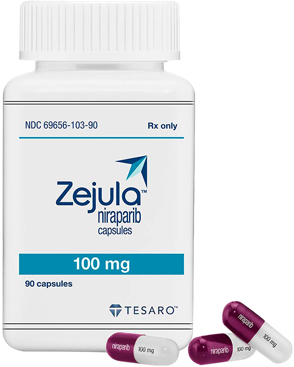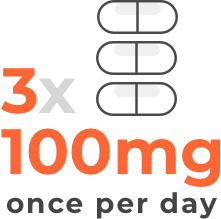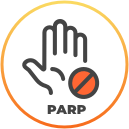
What’s after platinum-based chemo?
Maintenance treatments for ovarian, fallopian tube or primary peritoneal cancer (PPC) are important for patients in remission as they may slow down the return or progression of cancer. Zejula (niraparib) is one such treatment and offers an alternative to the “watch and wait” approach.
Niraparib (Zejula) is a maintenance treatment. This means that it is not used to treat cancer in the first place, but it is prescribed to women who are taking other medicines to treat their cancer and are responding well to the treatment. These patients can take niraparib (Zejula) once per day with the aim of prolonging the time before the cancer comes back or progresses. Niraparib (Zejula) is approved in the USA by the FDA and in Europe by the EMA. Although it is not globally available, patients to whom it is not accessible can import this medicine into their country, safely and legally.
Niraparib (Zejula) is a medicine for adult patients with recurrent epithelial ovarian, fallopian tube, or primary peritoneal cancer who are in a complete or partial response to platinum-based chemotherapy. Damaged cells (including cancer cells) rely on certain mechanisms to repair themselves, including: using PARP enzymes to help with self-reparation. Another mechanism of reparations of damaged cells involves BRCA genes. In some patients, BRCA genes can be deficient, which leaves the cells relying on the “PARP pathway” for reparation. Niraparib (Zejula) is a PARP* inhibitor and is designed to stop PARP enzymes. It has shown to be effective both in cells with and without deficiencies in BRCA genes, with better results when the deficiencies were present. It is an oral medication taken once per day, which makes it less impactful on patient’s quality of life than an infusion.
Learn more about costs and delivery
* PARP = poly(ADP-ribose) polymerase
Niraparib (Zejula) was tested on 553 women with recurrent epithelial ovarian, fallopian tube, or primary peritoneal cancer. The women had received at least 2 platinum-based chemotherapy treatments and had a complete or partial response to their most recent chemotherapy treatments.
The participants from the clinical trial were divided into two groups depending on whether they had a mutation in the BRCA gene (BRCA-positive or BRCA-negative), a gene involved in repairing damaged DNA. In both groups, some women received niraparib (Zejula) and some received a placebo. In the trial, women taking niraparib (Zejula) experienced a longer time period before their tumours worsened, compared to the women who took the placebo.
Moreover, the risk of disease progression decreased in women who took niraparib (Zejula) compared to those who took the placebo. The reduction in disease progression was 74% in BRCA-positve women and 55% in BRCA-negative ones.


For more details refer to the prescribing information at the bottom of the page.
The most common side effects include: abnormal blood counts, palpitations, gastrointestinal disorders, muscle pain, back pain, tiredness, decreased appetite, distortion of the sense of taste, urinary tract infection, AST/ALT elevation, headache, dizziness, insomnia, anxiety, nasopharyngitis, dyspnea (laboured breathing), cough, rash and hypertension. Serious adverse effects include thrombocytopenia, anaemia, and Myelodysplastic Syndrome/Acute Myeloid Leukemia (MDS/AML).
Please note this is not intended to be a comprehensive guide. Consult your treating doctor and the prescribing information at the bottom of the page for full details of side effects.
Niraparib (Zejula) is an oral medication taken daily. The recommended dose, according to the prescribing information, is 300 mg per day.
Please note this is not intended to be a treatment plan. For a personalised treatment plan consult your doctor. For more details, you can also reference the full prescribing information at the bottom of the page.

PARP inhibitors can help prevent cancer cells from repairing their damaged DNA, which can cause cancer cells to die. This may slow the return or the progression of cancer.




For more information about the way niraparib (Zejula) works, consult your doctor or see the prescribing information at the bottom of the page. This is not intended to be a comprehensive scientific explanation.

If you are a patient, or have a relative, with recurrent ovarian, fallopian tube, and primary peritoneal cancer, you might want to ask questions about the medicine for this disease. If you’d like to ask questions about how to get niraparib (Zejula), or about our service in general, our team of qualified pharmacists and experts are ready to offer support and assist with queries. Our team speaks 17 different languages and is ready to help.
everyone.org makes the latest approved medicines available to patients, hospitals and doctors around the world, in a legally compliant way. We source innovative medicines at the best possible prices and ensure safe and efficient delivery. We have successfully delivered to over 88 countries worldwide, and have already supported over 11,000 doctors and patients.
Find out more